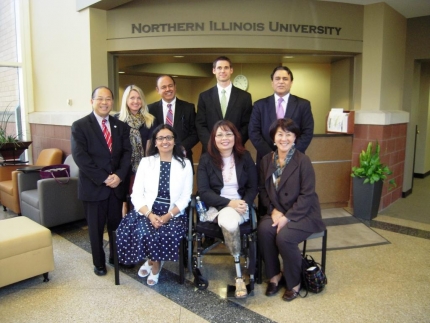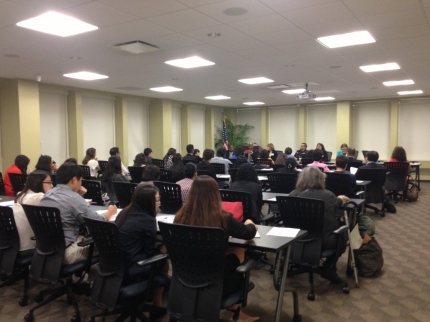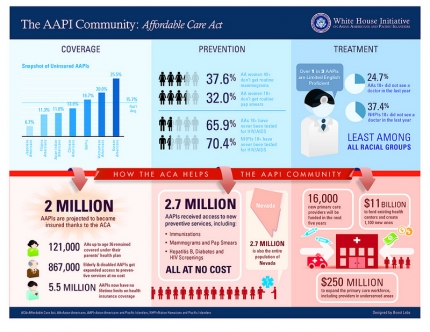Initiative on Asian Americans and Pacific Islanders Blog
Chicago Regional Interagency Working Group: Continuing the Dialogue with the AAPI Community
Posted by on August 29, 2013 at 4:05 PM ESTOn Friday, August 23, 2013, the Regional Interagency Working Group (RIWG) of the White House Initiative on Asian Americans and Pacific Islanders hosted its second community forum in Illinois. The event – which drew over 50 community members – was hosted by Congresswoman Tammy Duckworth, the first Asian American elected to Congress from Illinois, and took place at Northern Illinois University in DuPage County, where Asian Americans represent more than 11% of the county’s population. Representatives from the Small Business Administration, Social Security Administration, Department of Labor, and General Services Administration participated in the event.
Participants had the opportunity to hear from RIWG members about the impact of the Affordable Care Act on small businesses; the way in which the federal government is leveraging technology to meet the growing needs of the American public; the importance of safeguarding workers; and information on how to do business with the federal government. The RIWG members also provided resources for participants to access additional information about federal government programs.
The event is part of our ongoing conversations with the AAPI community in the Chicago region. The RIWG’s mission is to provide information about the various federal government resources available to the AAPI community and to hear about specific community concerns and issues. Sign up to receive the Initiative’s weekly highlights for more information on upcoming events in your area.
Ann Kalayil is the Regional Administrator of the Great Lakes Region at the U.S. General Services Administration and a Regional Interagency Working Group Member.
.
Learn more aboutToday: Learn About the Health Insurance Marketplace in Korean
Posted by on August 27, 2013 at 9:13 AM ESTOur Korean in-language Hangout will take place today, Tuesday, August 27, 2013 from 3:00 - 4:00 PM (EST). We hope you will join the conversation – in Korean! Our goal is to bring greater awareness of health care to the AAPI population, so that all people achieve their full potential for health. Join our Google hangout here.
Maria Pastrana Lujan is an Outreach Advisor at the White House Initiative on Asian Americans and Pacific Islanders.
오늘: 한국어로 안내되는 새의료보험 가입및 중요한 정보에 대해 알아보세요 (Korean Translation)
한국어로 진행되는 행아웃은 오늘 2013년 8월 27일 화요일 동부표준시로 오후 3시~4시에 열릴 예정입니다. 한국어로 진행되는 본 행사에 많은 분들이 참석하시기를 기대하겠습니다! 이행사의 목표는 아-태 인들에게 의료보헙에 대한 경각심을 보다 더 일깨우는 데 있습니다. 그렇게 되면 모든 사람들이 최대한 건강을 누릴 수 있을 것입니다. 구글 행아웃에 같이 참여해주시고 트위터에 질문해주세요. 감사합니다.
Maria Pastrana Lujan은 아시아 태평양계 미국인을 위한 백악관 행정명령의 (WHIAAPI) 아웃리치 담당 고문 입니다.
Learn more about Health CareCitizenship and Our Global Competitive Advantage
Posted by on August 23, 2013 at 12:41 PM ESTAugust 21, 1991 was a pivotal day—it was the day I boarded a plane in my native Lahore, Pakistan and traveled to the United States to pursue higher education and eventually build a career. Today, I am fortunate to be leading a global technology company based in Silicon Valley and having the honor of representing my community at the federal level as a member of President Obama’s Advisory Commission on Asian Americans and Pacific Islanders (AAPI).
My immigration story is not inherently about family or necessity— it is about the pursuit of opportunity. I was drawn to America’s innovative spirit and the possibility that I could do anything if I worked hard at it. The entrepreneurial spirit that drew me to this country is America’s core strength. And for America to inspire and attract future generations of the world’s finest talent, a fair and efficient immigration system is a must.
My role in the private sector involves significant travel and work abroad. I see how emerging markets are fast catching up with the developed economies through investments in education, science and technology, and the adoption of dynamic economic policies. In an increasingly competitive global environment, immigration is critical to the United States' maintenance of its competitive advantage across the globe. Immigrants have built some of the most innovative companies in the world. They maintain critical networks in countries of origin which facilitate American exports. In Silicon Valley a significant number of founding teams of technology companies are comprised of immigrants from Asia. Across the country, immigrants improve the nation’s economic productivity and contribute immensely to sectors across our economy. A recent White House report has documented their economic impact.
As an immigrant who came to this country as a college student, joined the high-tech industry as a professional, and is now serving as C.E.O of a technology venture managing a global team, I have experienced first-hand the challenges of our broken immigration system. Our broken immigration system hampers the flow of immigrant contributions to the country’s economy. Streamlining and improving immigration processes for future drivers of the U.S. economy––students who want to pursue careers in engineering, aspiring entrepreneurs who would create jobs for Americans, trained professionals who possess high-demand skills––would only enhance immigrants’ positive impact on the United States economy and society overall. I am proud to stand amongst “the Geeks” as the White House spotlights the best of those in the STEM field this week through the “We the Geeks” Google+ Hangout series.
Immigration reform, however, will not be whole and fair without a comprehensive approach. The economic imperative of drawing engineers and scientists to the United States is not at the expense of addressing the moral challenge posed by the presence of millions of undocumented immigrants in this country. Silicon Valley, where I work and live with my family, is also home to undocumented immigrants who play an important role in the region’s economic vitality, and who would significantly benefit the U.S. economy if they were brought out of the shadows. With the proposed commonsense reform that recently passed the Senate with a strong bipartisan majority, we have a historic opportunity to build a smart, effective immigration system that continues efforts to secure our borders, requires every business and every worker to play by the same set of rules and provides an earned path to citizenship for undocumented immigrants. Together we can build a fair immigration system that lives up to our heritage as a nation of laws and a nation of immigrants.
Dilawar Syed, President and CEO of the Silicon Valley-based Yonja Media Group, is a member of the President’s Advisory Commission on Asian Americans and Pacific Islanders.
Learn more about ImmigrationCoordinating Outreach to the AAPI Community: New York Regional AAPI Forum
Posted by on August 21, 2013 at 1:53 PM ESTThe Regional Interagency Workgroup (RIWG) of the White House Initiative on Asian Americans and Pacific Islanders strives to share information and resources with AAPI communities in each region across the nation. Over 75 individuals from 17 agencies currently participate in the RIWG, and the New York RIWG is one of the largest ones, with 24 federal agencies participating.
On Thursday, August 15, 2013, the New York RIWG hosted an AAPI forum. The event drew over 150 participants from New York and New Jersey representing AAPI advocacy groups, community based organizations, employers, elected officials, and local state agencies. Participants interacted with regional senior officials to learn about available federal resources, and they joined workshops to discuss issues of importance in their communities: workers’ rights, small businesses, health and social services and housing. Feedback from participants and presenters was overwhelmingly positive, with one participant stating “Yesterday’s initiative contributed to the importance of the work that our organizations do for our residents as we face new and exciting challenges in the future. As I sat through three of the workshops, I saw that you successfully captured the essence and highlighted all the programs that Asian Americans and Pacific Islanders and so many more of our residents need to have a better quality of life”.
Forums like this help us understand each community’s distinct needs so that we can better serve you, and we encourage you to participate in an upcoming forum in your region. Sign up to receive the Initiative’s weekly highlights for more information on upcoming events in your area.
Dr. Michelle S. Davis, Regional Health Administrator, U.S. Department of Health and Human Services, Office of the Assistant Secretary for Health and Regional Interagency Working Group Member
Learn more about Health CareAffordable Care Act: Creating Health Access for Asian Americans and Pacific Islanders
Posted by on August 20, 2013 at 5:19 PM ESTEd. note: This is cross-posted from the HHS Blog.
Every one of us knows someone- a friend, a relative, or maybe a patient- who couldn’t receive the care they needed because they lacked insurance. Thankfully, this will start to change on October 1, 2013, when people can sign up for coverage through the Health Insurance Marketplace, with benefits beginning as early as January 1, 2014.
The Affordable Care Act — what some may know as Obamacare, health reform, or the health care law of 2010 — is a historic piece of legislation that can reduce health disparities in our nation. Of note, a lot in the health care law represents good news for Asian Americans and Pacific Islanders.
Through provisions of the Affordable Care Act, more Americans will have access to affordable health care coverage. For Asian Americans and Pacific Islanders, the law’s benefits will help reduce disparities in both health care and health outcomes through expanded insurance coverage and better access to high-quality health care services.
For example, the Affordable Care Act has enabled 121,000 young Asian American and Pacific Islanders ages 19 to 25 to gain health coverage, because they can now stay on their parents' plans until age 26.
Also, about 3.8 million Asian Americans and Pacific Islanders with private insurance have gained expanded coverage of free preventive care, such as mammograms, diabetes screenings, and hepatitis A and B vaccines for infants, children, and adults.
Lastly, nearly 2 million uninsured Asian Americans and Pacific Islanders will have new opportunities for coverage through the Health Insurance Marketplace.
As a Korean American son of immigrants, I am personally committed to help ensure that the nearly 1 in 5 Asian Americans and Pacific Islanders (AAPIs) who currently lack health insurance now have access to high quality, affordable health coverage. And as a physician and Assistant Secretary for Health, I am confident that the Affordable Care Act will deliver on the promise of better insurance, better care, and better prevention to elevate the public health of all Americans.
This is our chance to make the dream of quality, affordable health insurance a reality for millions of Americans in all of our communities. If we work together, America will be a country where all people have the opportunity to attain their highest achievable level of health.
Howard K. Koh, M.D., is the MPH Assistant Secretary for Health.
Learn more about Health CareLearn About the Health Insurance Marketplace in Korean
Posted by on August 16, 2013 at 11:30 AM ESTNearly 1 in 5 Asian Americans and Pacific Islanders (AAPIs) do not have health insurance. We know that health coverage is important to our families, and now, it will be more accessible than ever through the Affordable Care Act —what some may know as Obamacare, health reform, or the health care law of 2010.
You’ve probably heard about the new Health Insurance Marketplace, which will be open on October 1. But you probably still have questions, like what is the Marketplace, and can I really get health insurance?
To provide information about the new Health Insurance Marketplace, to members of the AAPI community who do not understand, or have difficulty understanding English, I’m excited to announce that the White House Initiative on AAPIs will host a series of online Google+ Hangouts in AAPI languages.
The first of these Hangouts will be in Korean. During the Hangout, there will be a live question and answer period with representatives from the U.S. Department of Health and Human Services. They will respond to your questions and provide information on how to obtain health care coverage through the new Marketplace.
The Korean in-language Hangout will take place on Tuesday, August 27, 2013 from 3:00 - 4:00 PM (EST). We hope you will join us by watching live at a local viewing party or online by joining our Google Hangout. You may also submit your questions in advance, by emailing whitehouseaapi@ed.gov or tweeting them to @WhiteHouseAAPI. More information about the in-language Hangouts can be found on the WHIAAPI website, and more information about the Affordable Care Act can be found here.
We hope you will join the conversation – in Korean! Our goal is to bring greater awareness of health care to the AAPI population, so that all people achieve their full potential for health.
Dr. Howard K. Koh, MD, MPH, is the Assistant Secretary for Health at the U.S. Department of Health and Human Services.
한국어로 건강 보험 마켓플레이스에 대해 알아 보십시오
작성: Howard Koh 박사
아시아계 미국인과 태평양 제도민(AAPI)의 약 5명 중 1명이 건강보험을 가지고 있지 않습니다. 건강 보험이 우리 가족들에게 중요하다는 것을 우리 모두 알고 있습니다. 혹자에게는 오바마케어, 건강개혁 또는 2010년 헬스케어법으로도 알려져 있는 의료보험개혁법을 통해 이제 건강 보험은 우리에게 보다 가까워질 것입니다.
여러분 중에는 새로운 건강 보험 마켓플레이스라는 것을 들어보셨을 것입니다. 이것은 10월 1일부터 이용할 수 있게 될 것입니다. 그렇지만 여러분은 마켓플레이스라는 것이 무엇인지, 아니면 내가 진짜 보험을 갖게 될 수 있을지 같은 궁금증을 가지고 계실 것입니다.
영어 구사가 쉽지 않은 AAPI 커뮤니티 가입자들에게 이 새로운 건강 보험 마켓플레이스에 대한 정보를 제공해드리는 행사에 관한 소식을 하나 전해드리겠습니다. AAPI에 대한 백악관 캠페인을 통해 여러 차례의 온라인 구글+ 행아웃 행사를 AAPI 가입자의 언어로 주최할 예정입니다.
이 행아웃 이벤트의 첫 언어는 한국어입니다. 행아웃 진행 중에 미국 보건복지부의 담당자가 나와 실시간으로 질의 응답을 할 예정입니다. 담당자는 여러분의 질문에 답해드리고 새로운 마켓플레이스를 통해 어떻게 건강 보험을 얻을 수 있는지에 관한 정보를 제공해드릴 것입니다.
한국어로 진행되는 행아웃은 2013년 8월 27일화요일동부표준시로 오후 3시~4시에 열릴 예정입니다. 현장 참여 모임에서 직접 행사를 보시거나 온라인으로 구글 행아웃에 참여하시어 내용을 보실 수 있습니다. 여러분의 질문을 이메일로 whitehouseaapi@ed.gov에 미리 제출하시거나 @WhiteHouseAAPI로 트윗을 하실 수도 있습니다. 모국어로 진행되는 행아웃에 대한 보다 자세한 정보는 WHIAAPI 웹사이트에서 확인하실 수 있으며 의료보험개혁법에 대한 보다 자세한 정보는 여기를 클릭하셔서 얻으실 수 있습니다.
한국어로 진행되는 본 행사에 많은 분들이 참석하시기를 기대하겠습니다! 저희의 목표는 AAPI 이용자들에게 건강관리에 대한 경각심을 보다 더 일깨우는 데 있습니다. 그렇게 되면 모든 사람들이 최대한 건강을 누릴 수 있을 것입니다.
Howard K. Koh(의학박사, 공중보건석사) 박사는 미국 보건복지부의차관보입니다.)
"Korean Translation"Learn more about Health Care
- &lsaquo previous
- …
- 25
- 26
- 27
- 28
- 29
- 30
- 31
- 32
- 33
- …
- next &rsaquo
White House Blogs
- The White House Blog
- Middle Class Task Force
- Council of Economic Advisers
- Council on Environmental Quality
- Council on Women and Girls
- Office of Intergovernmental Affairs
- Office of Management and Budget
- Office of Public Engagement
- Office of Science & Tech Policy
- Office of Urban Affairs
- Open Government
- Faith and Neighborhood Partnerships
- Social Innovation and Civic Participation
- US Trade Representative
- Office National Drug Control Policy
categories
- AIDS Policy
- Alaska
- Blueprint for an America Built to Last
- Budget
- Civil Rights
- Defense
- Disabilities
- Economy
- Education
- Energy and Environment
- Equal Pay
- Ethics
- Faith Based
- Fiscal Responsibility
- Foreign Policy
- Grab Bag
- Health Care
- Homeland Security
- Immigration
- Innovation Fellows
- Inside the White House
- Middle Class Security
- Open Government
- Poverty
- Rural
- Seniors and Social Security
- Service
- Social Innovation
- State of the Union
- Taxes
- Technology
- Urban Policy
- Veterans
- Violence Prevention
- White House Internships
- Women
- Working Families
- Additional Issues



